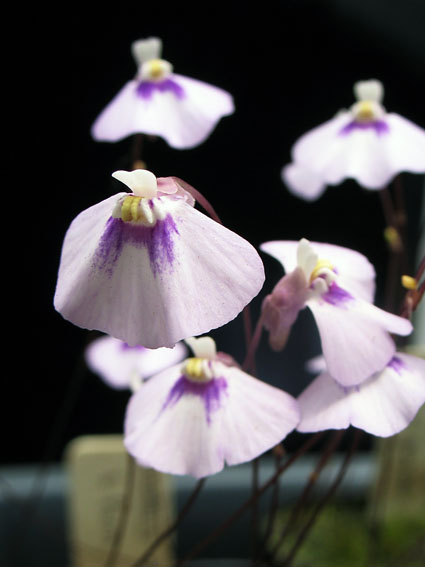Victorian Utricularia
Australis
Beaugleholei
Dichotoma
Grampiana
Gibba
Lateriflora
Monanthos
Tenella
Uniflora
Violacea
Loading........ please wait
Utricularia dichotoma

Flowering time
Spring and summer.Flower Colour
Pink/Purple,occasionally white.Flower Details
Usually several 1cm flowers per stem.Height
5-15cm.Diameter
1-3cm.Habit
Semi aquatic perenial.Habitat
Permanently or less commonly seasonally wet ground,often in or near swampsConservation Status
Widespread but not common.Dormancy
Some forms have a summer dormancy.Notes
This species may have the ability to survive as an annual in difficult seasons.In the right conditions many plants of this species can produce a spectacular display of flowers. May continue to flower for months under the right conditions.U.dichotoma has a wide range covering most of Australia and is quite variable over it.There is a form that grows in seasonally wet areas and produces a tuber over summer.

Utricularia uniflora

Flowering time
Spring and SummerFlower Colour
Pink/Purple,occasionally white.Flower Details
As the name suggests usually one 1cm flower per stem.Height
5-15cm.Diameter
1-3cm.Habit
Semi aquatic.Habitat
Permanently wet ground,often in or near streamsConservation Status
Not common in Victoria but more common in other parts of Australia.Dormancy
NoneNotes
Another species similar to U.Dichotoma.It can be distinguished byt the 6 ridges on its palate.Utricularia gibba

Flowering time
SummerFlower Colour
Yellow.Flower Details
Usually one 8mm flower per stem.Width
30cm or more.Can form large tangled masses.Diameter
30cm or more.Habit
Aquatic.Habitat
Lakes and pools with permanent water.Conservation Status
Common and widespread.Dormancy
NoneNotes
This plant is common world wide and has very small bladders.It is possibly the easiest aquatic Utricularia to cultivate.

Utricularia lateriflora

Flowering time
SpringFlower Colour
Pink/purple.Flower Details
Usually one 5mm flower per stem.Height
3-8cm.Habit
Semi-aquatic with very small leaves.Diameter
1cm.Habitat
Permanently wet ground.Conservation Status
Not commonDormancy
None.Notes
Often grows in association with Drosera binata or Drosera spatulata.Utricularia monanthos

Flowering time
SummerFlower Colour
Pink/purple.Flower Details
Usually one 1cm flower per stem.Height
3-5cm.Diameter
1-3cm.Habit
Semi Aqautic with very small leaves.Habitat
Permanently wet ground,mainly in alpine areas.Conservation Status
Localized.Dormancy
WinterNotes
Often grows near Drosera arcturi.Utricularia violacea

Flowering time
SpringFlower Colour
Purple/PinkFlower Details
One 5mm flower per stem.Height
5cmDiameter
1-2cm.Habit
Small annual terrestrial.Habitat
Wet areas that dry out in summer.Conservation Status
Uncommon in Victoria but more common in other parts of Australia.Dormancy
None.Notes
Grows near the Victorian border.Utricularia beaugleholei

Flowering time
Spring or summerFlower Colour
Pink/purple.Flower Details
Several 1-3cm diameter flowers per stem which rises way above water level.Height
5-20cm.Diameter
1-6cm.Habit
Semi-Aquatic with small leaves.Can survive as an annualHabitat
At its best in open positions in wet ground in pools or swamps that usually dry out in summer.It can grow in slightly shaded areas as well.Rarely seen flowering in water deeper than 15cm.Conservation Status
This is mainly a Victorian species with plants also being recorded in South Australia and New South Wales.It is probably the rarest Australian Utricularia and despite its fantastic adaptations to survive in its habitat is diminishing due to habitat destruction and climate change.It is uncommon to rare.Dormancy
NoneNotes
Possibly the most spectacular Australian Utricularia and not well studied. At first sight similar to U.dichotoma however U.beaugleholei is often an annual and grows in a completely different habitat.Under closer inspection differences in the flowers become evident.The palate has from 2-11 yellow ridges with U.dichotoma having only 2-3.U.beaugleholei is often associated with the water fern Marsilea and reeds indicating that standing water is commonly present in its habitat.At west Melbourne locations this plant survives as an annual and can easily survive several years of drought.This species also has the ability to delay flowering depending on the water level.Another interesting fact is that U.beaugleholei can set seed very quickly.It's habitat can dry out in 2 or 3 days from the time it is in full bloom yet it still produces plenty of seed.At west Melbourne locations the plants are usually in flower for only a week or so each year.
Utricularia tenella

Flowering time
SpringFlower Colour
Pink/purple.Flower Details
Usually one 3mm flower per stem.Height
3cm.Diameter
1cm.Habit
Annual terrestrial with very small leaves.Habitat
Moist to wet ground that dries out in summer.Conservation Status
Widespread,not common.Dormancy
NoneNotes
Very small plant that grows from Autumn to Summer.Utricularia Grampiana

Flowering time
SpringFlower Colour
PurpleFlower Details
One - several 1cm flowers per stem.Height
5-10cm.Diameter
1-3cm.Habit
Terrestrial with small leaves.Annual.Habitat
Wet areas that can dry out in summer.Conservation Status
Localized and common whithin its small range.Dormancy
NoneNotes
Often grows in masses. This species differs from U. dichotoma with presence of basiolute bracts with upper lobes about twice the length of lower; corolla upper lip cream with purple flecks.
Utricularia australis

Flowering time
SummerFlower Colour
YellowFlower Details
One-few 1cm flowers per stem.A few stems produced each season.Shy to flower at least at some locations.Width
5-40cm.Diameter
5-15cm.Habit
Aquatic forming a stem growing at one end.Habitat
Lakes and pools which usually do not dry out.Conservation Status
Common and widespread.Dormancy
Winter and/or Summer.Notes
Bladders can reach 0.5cm or more.The Victorian variety has the ability to form buds and go dormant over summer if the surroundings dry out.The dormant buds can survive several years of drought.This plant is incredibly tough and in good seasons thousands of plants can be found per swamp.At west Melbourne locations this plant is a shy flowerer possibly indicating that its main method of propagation is vegetative.Birds may spread this plant around from one swamp to another by carrying fragments of it in their feathers.
